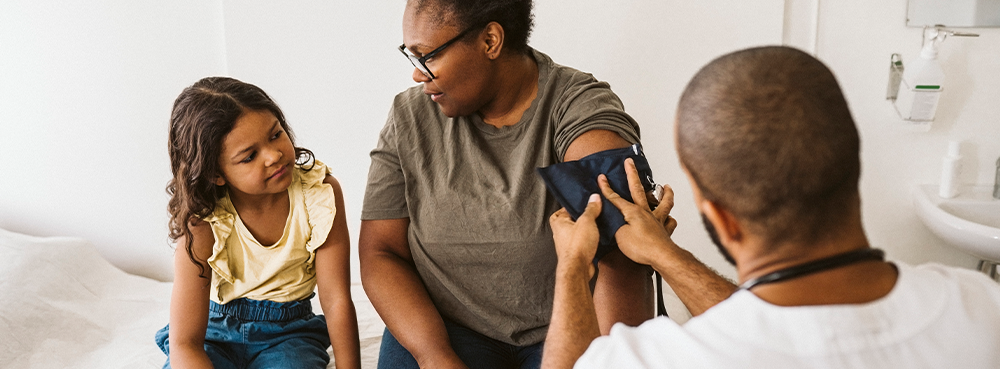High Blood Pressure

"When I found out high blood pressure ran in my family, I went to get checked. Knowing the impact of high blood pressure, I knew I had to take steps to make sure I was doing everything I could to protect myself." — Loretta
High blood pressure, also called hypertension, happens when the force of blood flowing through your blood vessels is consistently too high. Nearly half of American adults have high blood pressure. Many don’t even know they have it. High blood pressure is known as the "silent killer” because so many people have it and don’t know it.
With proper treatment and management, you can control your blood pressure to help you live a longer and healthier life.
- Have a yearly exam with your primary care provider (PCP) and get your blood pressure checked.
- Discuss your medications with your provider.
- Eat right and exercise. Eat healthy portions and have small, healthy snacks. Check the sodium levels on food labels. Speak to your PCP about your recommended daily salt intake. Move daily — adults should exercise for 30 minutes every day, and children for 60 minutes.
Signs and symptoms
Often there are no signs or symptoms, but these may occur:
- Headache
- Nosebleed
- Blood spots in the eyes
- Face flushing that causes redness or change in color
- Dizziness
The American Heart Association (AHA) recommends you do not try to diagnose yourself. See your provider annually for blood pressure checks and as needed for symptoms.
Risk factors:
- Family history: If your parents or other close blood relatives have high blood pressure, there’s an increased chance that you’ll get it, too.
- Age: The older you are, the more likely you are to get high blood pressure. Although, children can develop hypertension.
- Gender: Until age 64, men are more likely to get high blood pressure than women are. At 65 and older, women are more likely to get high blood pressure.
- Race: Black people tend to develop high blood pressure more often than people of any other racial background in the United States.
- Chronic kidney disease (CKD): High blood pressure may occur as a result of kidney disease. And having high blood pressure may also cause further kidney damage.
AHA recommendation
If your blood pressure is normal (less than 120/80 mm Hg), your blood pressure should be screened during regular health care visits yearly for anyone 20 years of age or older.
Other resources:
- Find a provider — Select providers from our skilled and extensive network.
- Call AmeriHealth Caritas Louisiana Member Service at 1-888-756-0004 (TTY 1-899-428-7588) 24 hours a day, seven days a week, and asked to be connected to Case Management for hypertension assistance and counseling.
- Manage your blood pressure with a heart-healthy diet. Here are tips from the AHA for what you can do every day to take steps toward better health.
